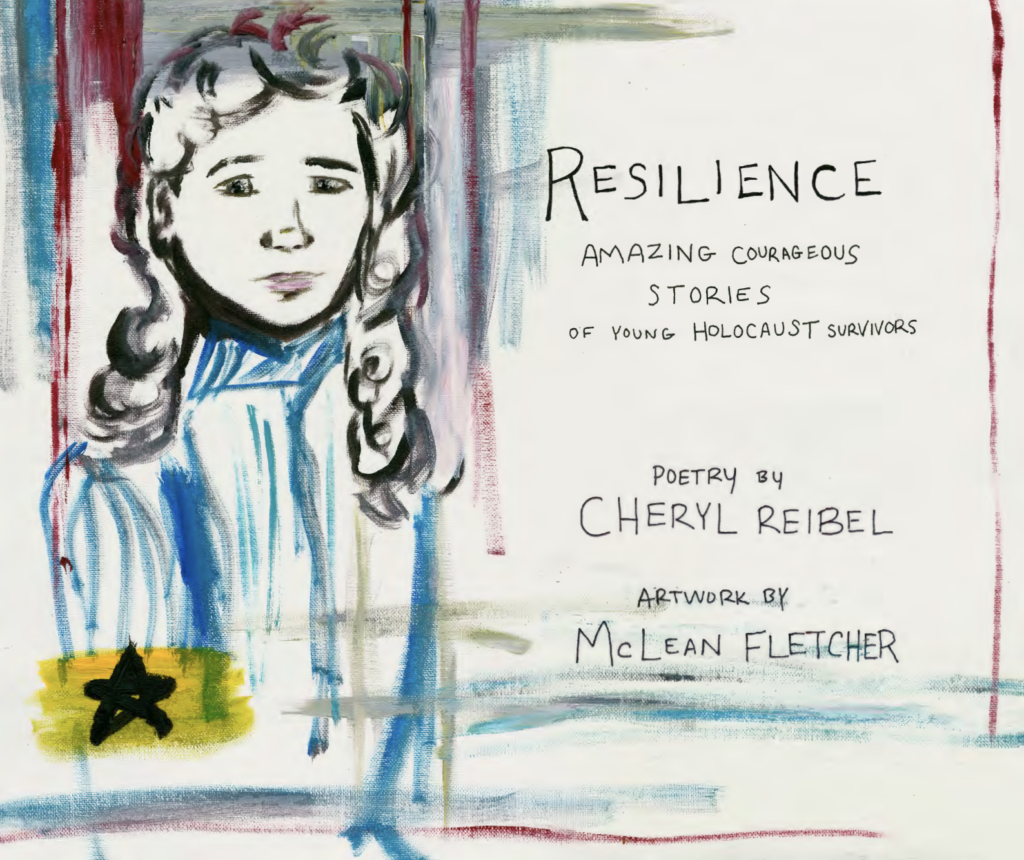Cheryl Reibel’s “Resilience” is a beautiful book of illustrated poetry. “Each poem is based on the real story of a Jewish child or teenager who lived through the Holocaust. “Each story is dear to my heart because they are also my family’s stories. My childhood brimmed with their tales of faith and fear and endurance. My parents, my aunts, my uncles, my neighbors – all of them were survivors.” I went on to study Journalism and Public Relations at New York University, and spent a semester at Tel Aviv University studying History. I received my certificate in Human Behavior from the New School in New York City. As I grew up, no story could ever compare what I heard around the dining room table and in the little park across the street from the school, told by people I thought of as my own family.
FMM: Has writing poetry always been part of your life?
Yes, poetry is brief but it opens large doors to the reader’s interpretation. It is written on visual description for it pleases the eye. In this book, I especially picked short poems to capture each story to get the young reader who is now used to texting and social media and visuals would find an attraction to the book. I later found people of all ages learning so much from it and emotionally affected.
FWM: Tell us what led you to the Resilience Project. Why is this so important to you?
It has been more than 70 years since the Holocaust and, one by one, we are losing our survivors to the march of time. This decade may well be the last where we will be able to hear their stories from their own lips. We are losing the wells of strength, wisdom, and humanity, and already, we the mistake of following the past. But we have a choice: We can learn from it, instead.
The Resilience Project seeds to keep the stories of these incredible survivors alive by connecting the past and the present. Join me in fostering tolerance, kindness, and healing through art. Let’s create a world where the tragedy of the Holocaust can, truly, never happen again — to anyone.
FWM: You joined forces with McLean Fletcher on your new book, “Resilience.” The book is beautifully illustrated poetry. Why was telling these powerful stories in poetry your choice of storytelling?
The brevity and simplicity of the poetry captures the childlike voices of these young survivors, who found ways to cope and endure, to find kindness amid cruelty and hope amid despair. The artwork is presented as if created by a child, with the innocence and inner strength of an abstract, imaginative mind. Or words and imagery seek to communicate the basic goodness and humanity that connects us, even as evil and tyranny continue to reappear in our world.
“Resilence” is receiving rave reviews.
“A masterpiece.”
The poems in Resilience are about Jewish children in Germany, Poland, and other areas of Eastern Europe enduring the events of the Holocaust (1941-1945 CE. ) They were, of course, not the only children who suffered during the war: from Western Europe to Africa, World War II’s atrocities traumatized children throughout the world.
“Deeply moving stories brought to life like never before.”
The suffering and death proved too much for many people – they despaired. However, for the children in these poems, they found hope in suffering, endured, and even fought back. Their experiences are varied: Some children escaped, others were forced to survive the horrors of the concentration camps. Many hid. But they survived.
FWM: Why is poetry a true art form?
It allows the reader to experience the words in relation to themselves and gives them to opportunity to see the intensity or expression of feelings.
Two Girls
Strangers in
the camp
no names
Branded arms
One number apart Do not show our numbers
Not a word between We want to stay opposite sided of the We want to keep our secrets morning line
The line to eat They will not separate us so little We will always be one number apart
FWM: What do you want people learn from “Resilience?” Where can we find it?
The result is a collection of 37 true stories in the form of poems. Each one captures and evokes the innocence and inner strength of these children, surviving even as the Nazis sought to crush both their hope and their lives. It is a good thing that I captured these stories when I did, though, because we are starting to forget. The book is currently in the Museum of Tolerance in LA, and the Holocaust Museum in Washington, D.C., and the library of Congress.
FWM: You are working on the second edition of “Resilience.” What can we expect to see?
I am currently working on the second edition of Resilience to include the forward that Viktor Frankl’s grandson Alex will provide. Resilience is also being translated into Hebrew and German for use not only as a book to read but also a learning tool in their curriculum. The second edition will include stories of these survivors and how resilient they were in their future choices.



